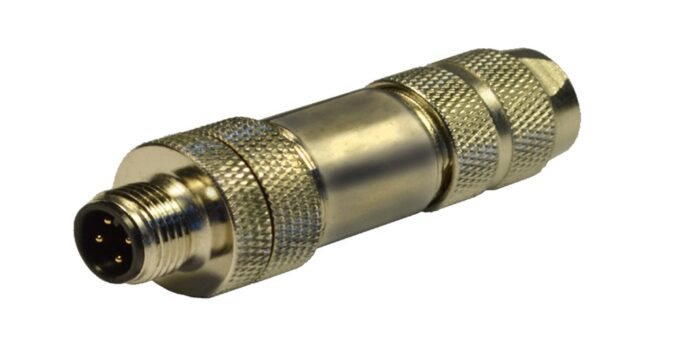Originally introduced by Lumberg Automation as an alternative to the RK30 sensor connector, M12 connectors (and M8 connectors, a smaller alternative) are versatile electrical connectors that are widely used in industrial automation systems, robotics, data transmission, and much more.
Here’s a high-level view of what you should know about these connector systems.
What Configurations Are Available in M12 Connectors?
There are many different configurations of M12 connectors available, including 2, 3, 4, 5, 6, 8, and 12-pin configurations. Male and female M12 connectors are also available in both straight and right-angle formats.
These connectors offer a number of advantages with respect to handling, as there are push-pull locking mechanisms, bayonet, and screw-type mechanisms available.
To prevent mis-matching cables, there are specific coding options that help designate them. M12 connectors are coded as either A, B, C, D, or X-coded connectors.
A-coded connectors are probably the most common and are typically associated with sensors, actuators, and motors. A-coded connectors can be used with DC power but can also be used for ethernet.
B-coded connectors are often used as Fieldbus connectors, such as Profibus or Interbus cables.
C-coded connectors are most often used with AC sensors and may feature dual-keyway security to ensure that no other connector besides a C-coded M12 is accidentally used.
D-coded connectors are commonly used in data transmission as ethernet cable connectors. D-coded connectors support up to 100 Mbit ethernet.
X-coded connectors are also commonly used for data transmission but can support higher data transfer speeds, up to 1 Gbit industrial ethernet, making them preferable to D-coded M12 connectors in some situations.
What Are They Made from and What Protections Do They Offer?
M12 connectors feature shells and pins made of a variety of materials that are used due to their physical durability, electroconductivity, and resistance to corrosion.
Some M12 connectors feature shells made of steel, copper, brass, gold, and a variety of other alloys. Some of them are sealed in order to protect against particulate and fluid ingress, which can be critical in some harsh environments. M12 connectors may variously offer IP67, IP68, or even IP69 protection.
Some M12 connector and cable assemblies are shielded to protect against EMI, and others offer protection against abrasion, extreme temperatures, chemicals, and other harsh environmental factors.
M12 connectors are variously made with brass, copper-alloy, and gold-plated contacts which offer a balance between corrosion resistance and favorable electrical conductivity.
What Industries Do M12 Connectors Support?
M12 connectors support a wide range of industries and applications, including but not limited to industrial and factory automation, data transfer, robotics and control systems, manufacturing and machining, renewable energy, and transportation.
Where Can I Find High-Quality M12 Connectors to Support My Facility?
Do you need to find a new, reliable supplier of M12 and other electrical connectors to support your facility or process?
Visit Products for Automation at the previous link. They carry a wide range of M12 connectors from Lumberg Automation, HTP, Sealon, MURR, and Sealcon (in a variety of configurations and cable lengths), as well as a large inventory of other products for industrial automation.


